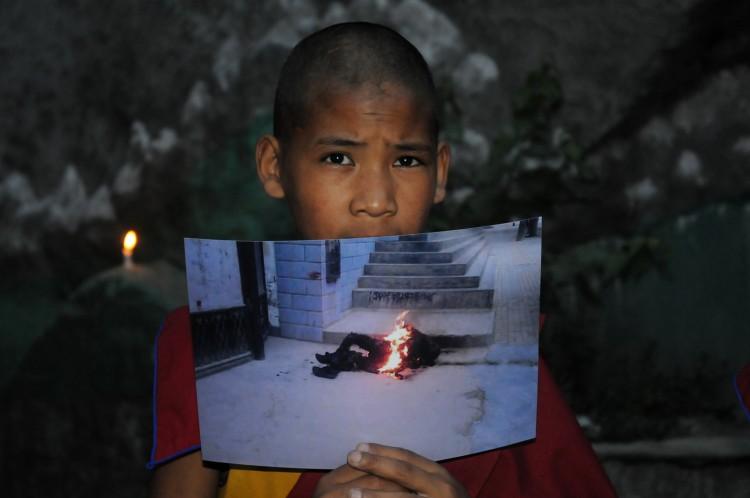EL MONTE, Calif.—Los Angeles Friends of Tibet member Tseten Phanucharas was the honoree of the seventh annual convention hosted by The Global Alliance for Democracy and Peace (GADP). Each year GADP honors Chinese dissident groups that have been oppressed by the Chinese regime in their struggles for freedom and democracy.
In front of a crowd of approximately 300 attendees at the Chinese Cultural Center No. 2, Phanucharas expressed her immediate concerns: “Right now, in preparation for the Olympics, and also once the Olympics started, the suppression of the Tibetan people has been really tremendous. There are so many Chinese troops stationed wherever there are Tibetans so they can keep an eye on them. If they raise their voices or speak out, they’ll be arrested and beaten. People are really suffering right now - much more than before because the authorities are very worried about Tibetans demonstrating.”
According to Phanucharas, there are 218 confirmed deaths of Tibetans since the Tibetan protests in March; 1,000 people have been injured; and 6,000 have been either arrested or detained.
Of those detained, she described, “Right now they have rounded up monks in various monasteries. Either the monasteries are completely closed, or they are taking monks somewhere else. Monks from Lhasa, the capital city, have been shipped to another part of China.”
Lhasa has many monasteries, but there are three main ones. According to Phanucharas, those three are the ones where authorities are primarily cracking down.
She continued, “Outsiders cannot see them, so they are basically in lockdown. Even though China promised to allow media freedom during the Olympics, it hasn’t applied to Tibet.”
Phanucharas spoke for 45 minutes and provided a historical account of Tibet, from how its writing was derived from ancient Sanskrit to its development up until 1951, when the People’s Republic of China (PRC) and the Tibetan government signed the 17-Point Agreement, which affirmed China’s sovereignty over Tibet, but was later repudiated by the Dalai Lama in 1959. The Tibetan government-in-exile claims that the agreement was signed under threat of a PRC-armed attack.
Phanucharas is a longtime advocate for Tibetan autonomy. She specified that autonomy is not the same as independence. Granting Tibet autonomy, she describes, would be a way to preserve Tibetans’ culture, religion, and unique nationality. The Chinese government, however, seems to insist that the Dalai Lama is demanding independence, despite his repeated clarifications, she said.
K.C. Chen, from the Global Alliance for Democracy and Peace, described how GADP’s purpose is to gain international support for the future independence of Taiwan by promoting the universal values of freedom, democracy, and human rights. He said, “Even though the subject today is Tibet, it’s in line with the things we have been doing [in Taiwan]. Whoever is not our enemy is our friend. Whoever is suffering from the oppression of the Chinese government is our friend.”
In front of a crowd of approximately 300 attendees at the Chinese Cultural Center No. 2, Phanucharas expressed her immediate concerns: “Right now, in preparation for the Olympics, and also once the Olympics started, the suppression of the Tibetan people has been really tremendous. There are so many Chinese troops stationed wherever there are Tibetans so they can keep an eye on them. If they raise their voices or speak out, they’ll be arrested and beaten. People are really suffering right now - much more than before because the authorities are very worried about Tibetans demonstrating.”
According to Phanucharas, there are 218 confirmed deaths of Tibetans since the Tibetan protests in March; 1,000 people have been injured; and 6,000 have been either arrested or detained.
Of those detained, she described, “Right now they have rounded up monks in various monasteries. Either the monasteries are completely closed, or they are taking monks somewhere else. Monks from Lhasa, the capital city, have been shipped to another part of China.”
Lhasa has many monasteries, but there are three main ones. According to Phanucharas, those three are the ones where authorities are primarily cracking down.
She continued, “Outsiders cannot see them, so they are basically in lockdown. Even though China promised to allow media freedom during the Olympics, it hasn’t applied to Tibet.”
Phanucharas spoke for 45 minutes and provided a historical account of Tibet, from how its writing was derived from ancient Sanskrit to its development up until 1951, when the People’s Republic of China (PRC) and the Tibetan government signed the 17-Point Agreement, which affirmed China’s sovereignty over Tibet, but was later repudiated by the Dalai Lama in 1959. The Tibetan government-in-exile claims that the agreement was signed under threat of a PRC-armed attack.
Phanucharas is a longtime advocate for Tibetan autonomy. She specified that autonomy is not the same as independence. Granting Tibet autonomy, she describes, would be a way to preserve Tibetans’ culture, religion, and unique nationality. The Chinese government, however, seems to insist that the Dalai Lama is demanding independence, despite his repeated clarifications, she said.
K.C. Chen, from the Global Alliance for Democracy and Peace, described how GADP’s purpose is to gain international support for the future independence of Taiwan by promoting the universal values of freedom, democracy, and human rights. He said, “Even though the subject today is Tibet, it’s in line with the things we have been doing [in Taiwan]. Whoever is not our enemy is our friend. Whoever is suffering from the oppression of the Chinese government is our friend.”



